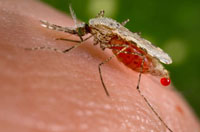
Top stories






More news


Marketing & Media
Ads are coming to AI. Does that really have to be such a bad thing?














Malaria parasites infect and destroy red blood cells when they enter the blood stream. Symptoms include fever and flu-like symptoms, such as chills, headache, muscle aches, tiredness, nausea, vomiting and diarrhoea.
Severe malaria (only caused by P. falciparum)
Infection with P. falciparum, if not promptly treated, can quickly progress to severe malaria. The main symptoms of severe malaria include: coma, severe breathing difficulties, low blood sugar, and low blood haemoglobin (severe anaemia). As they have little or no immunity to the parasite, children are particularly at risk. If untreated, severe malaria can lead to death.
Cerebral malaria (only caused by P. falciparum)
Malaria is classified as cerebral when it manifests with cerebral symptoms, such as coma.
The most hospitals which have recorded the highest numbers of malaria patients are Donald Frazer, Nkhensani, Malamulele, Musina and Maphutha Malatjie.
